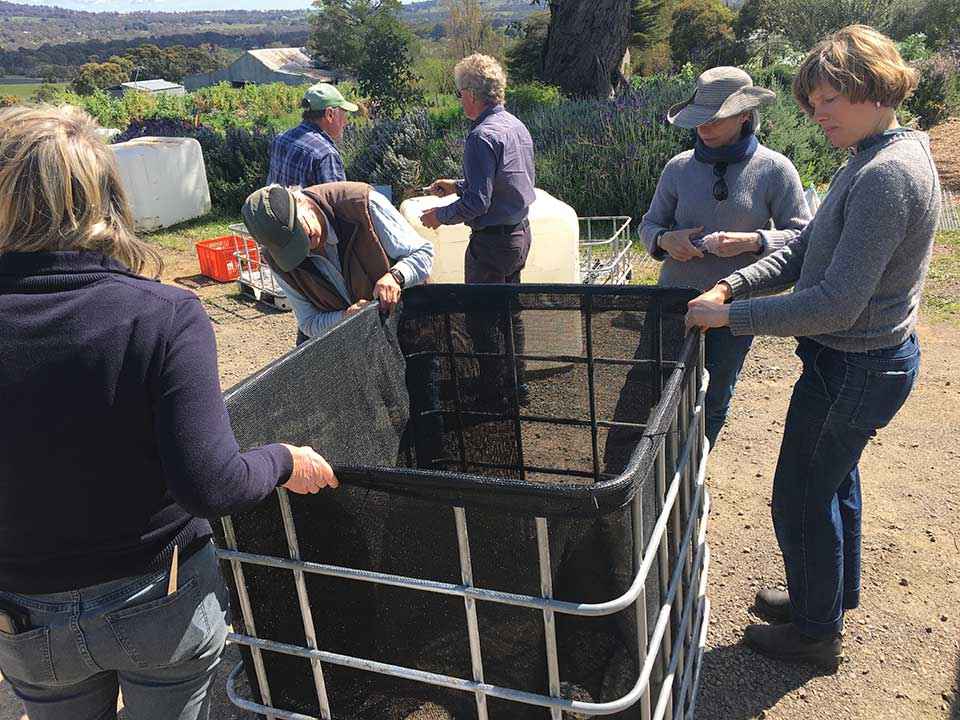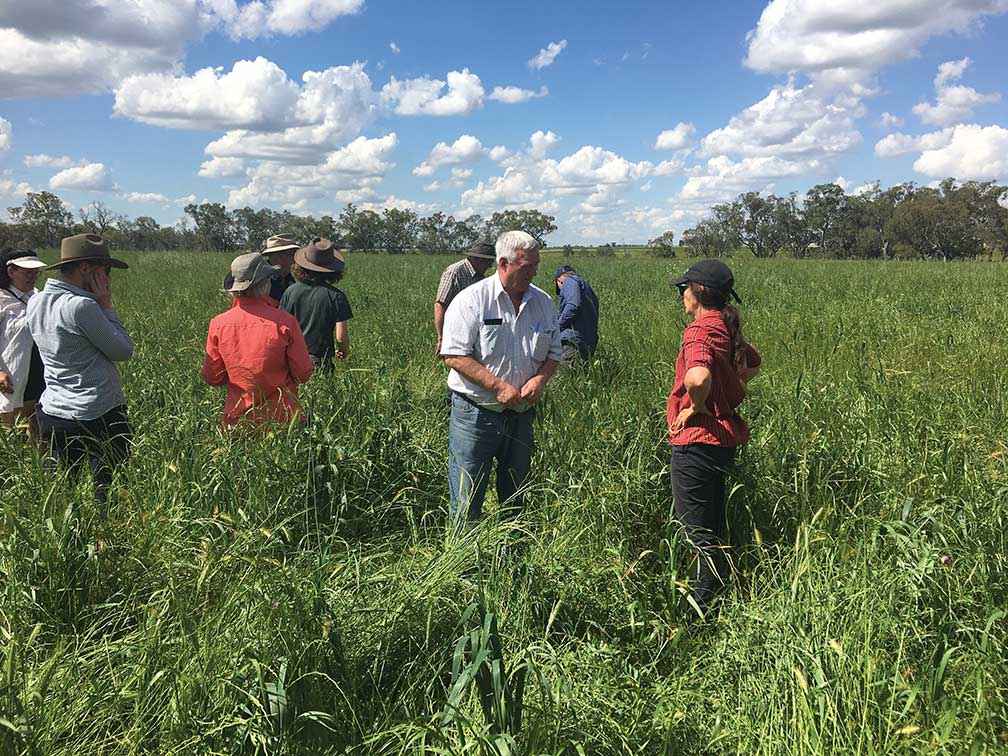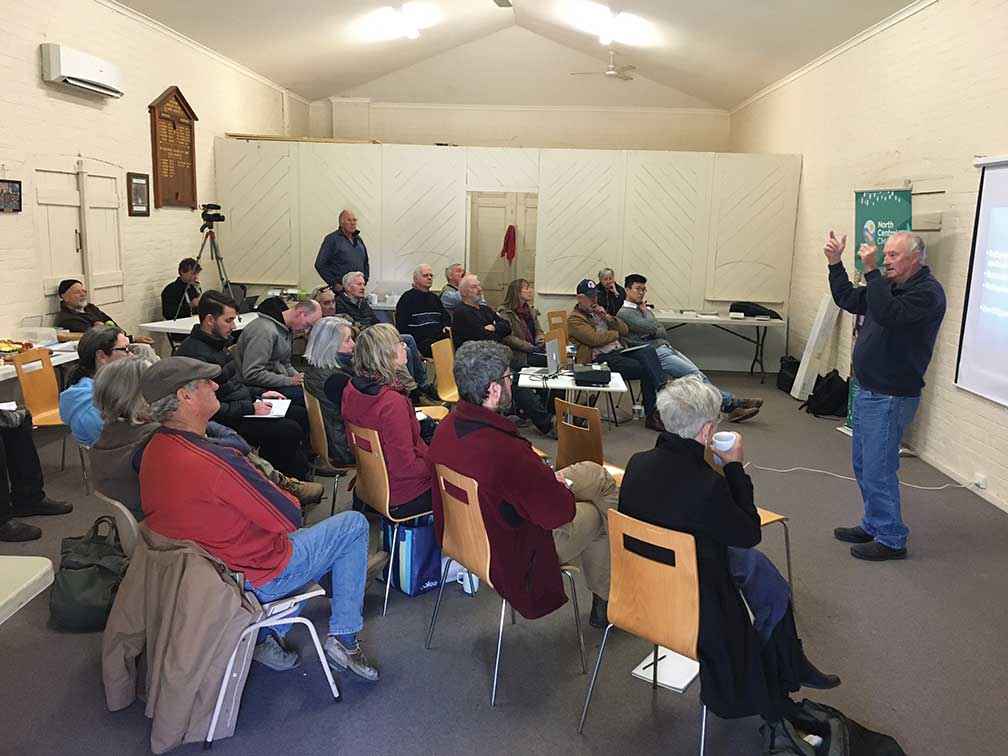Victorian Landcare Magazine - , Issue 89

The Mt Alexander Regenerative Agriculture Group (MARAG), was formed in 2018 with funding support from the North Central CMA, which was keen to encourage the uptake of sustainable agriculture practices consistent with Landcare objectives.
MARAG provides an opportunity for farmers to participate in a collaborative program that builds understanding and skills to help them adopt more sustainable practices. The group is based around Castlemaine in north central Victoria and involves farmers from across the region. MARAG’s approach is flexible rather than prescriptive, fostering and demonstrating an exciting potential for innovation in agriculture.
MARAG members are a diverse group involved in a range of enterprises including grazing, cropping, horticulture, dairy, and market gardening. They have come together due to a common interest in finding innovative approaches that minimise the use of industrial chemicals and fertilisers, is nature friendly, builds soil carbon and helps regenerate natural ecological systems from the soil upwards.
Some MARAG members are involved with community supported agriculture, biodynamic and/or organic farming, while others are more mainstream but still wishing to tread more lightly on the landscape. Being able to supply produce directly to the local community is a motivator for many.
Designing and delivering a program that could meet the objectives of our key funding partner, the National Landcare Program, meant producing a detailed community action plan. The plan defined the scope of the project, objectives and outcomes, funding available, level of participation, extent of trials and demonstrations, resource provision, unequal skill levels, and knowledge transfer. Soil constraints, farm management practices, seasonality, and level of core competencies per farmer participant were also factored in.
The group has had to deal with failure and frustration. This was evident when we established pastures under transition from annuals to perennials – starting with both winter and summer active multi-species cover crops to help prime the soil, bridge the classic summer feed gap and account for seasonal climate variability risk. Trial and error were needed to get the best result. We’ve learnt that getting something right the first time is exciting but does not guarantee repeat success without the learning opportunity.
Most members of MARAG have preferred to adopt regenerative agriculture principles which favour non-chemical bio-friendly practices, with the challenges this may bring.
The current agriculture paradigm is heavily reliant on the use of herbicides to control weeds, and low impact interventions such as no-till sowing. Most members of MARAG have preferred to adopt regenerative agriculture principles which favour non-chemical bio-friendly practices, with the challenges this may bring.
Successes experienced by the group include the use of industry experts as mentors, active collaboration between members, and knowledge sharing between group members, facilitated by social media platforms such as WhatsApp.

Above: MARAG farmers inspecting a successful multi-species cover crop at Runnymede, Elmore, in November 2022.
Sutton Grange farmer Zane Trounson said that before MARAG he knew near nothing about soil tests, grazing, multi-species cover crops or grass identification.
“I now practise holistic managed grazing with our cattle – to great benefit to the pasture and stock. I can now name native and pasture grasses and have incorporated multi-species cover crops into our garlic enterprise which has transformed the soil and garlic end product,” Zane said.
Another success has been the structure of the MARAG program’s learning curriculum Regen Ag 101, which was developed to enable farmers to gain a more complete understanding of their soils, the interactions between plants, fungi, animals, and soil microbes.
The core themes include understanding soil tests, small water cycle, soil microbes and plant biology, planned grazing and production, multi-species cover cropping, livestock nutrition, soil carbon sequestration and emission reduction, bio-amendments, compost-biochar-dung beetles, biodiversity, revegetation and pasture audit. The themes are delivered through a combination of workshops, webinars, and field events

Above: A MARAG pasture management workshop with Colin Seis in Castlemaine in March 2024.
After participating in a small water cycle and soil carbon workshop, farmer Tony Cordy reported that he did some soil pH testing on his property in several locations.
“I have been looking in my fertiliser handbook to work out what it all means. One neighbour spread gypsum many years ago and it seemed to go well. I enjoyed the workshop. It is a very good group,” Tony said.
Barfold cattle farmers Grant and Kerry Connoley were impressed by a visit from grazing educator Dick Richardson.
“The visit really broadened my horizon regarding what is possible on our farm. It turned ideas into reality,” Grant said.
MARAG members are committed to sharing resources including monitoring and measuring equipment, foliar spray units, electric fences, seed, DIY workshops and laboratory testing equipment.
MARAG members are committed to sharing resources including monitoring and measuring equipment, foliar spray units, electric fences, seed, DIY workshops and laboratory testing equipment. This is hugely valuable to all involved.
By participating in MARAG our members are increasing farm profitability, building a community of practice, producing food for the local community, creating an opportunity to be paid for increases in soil carbon and be recognised for achieving carbon neutral status, as well as helping increase net primary productivity across the region.
Deane Belfield is the lead facilitator and developer for the MARAG program. For more information go to www.masg.org.au/agriculture/regenerative-agriculture/